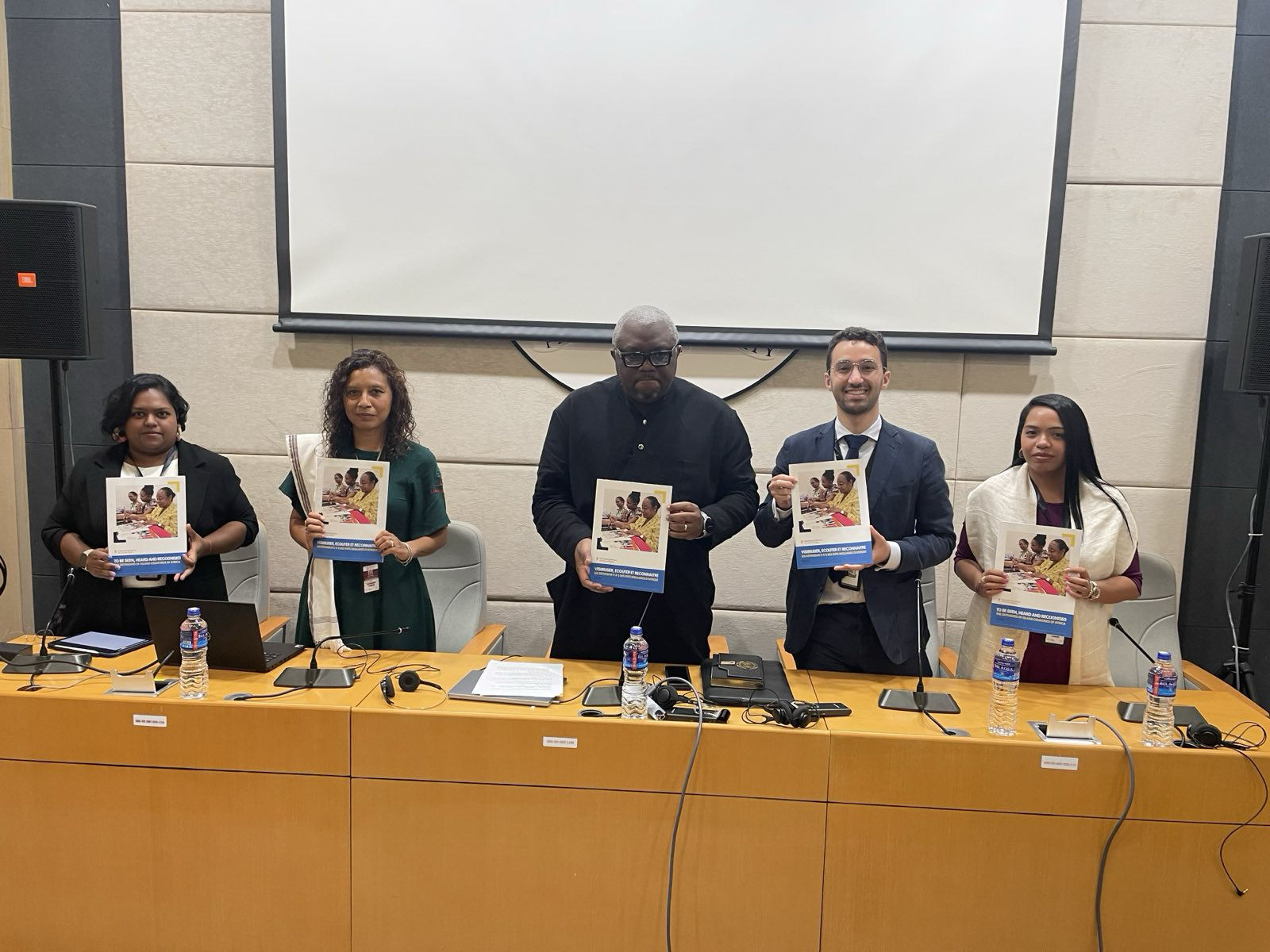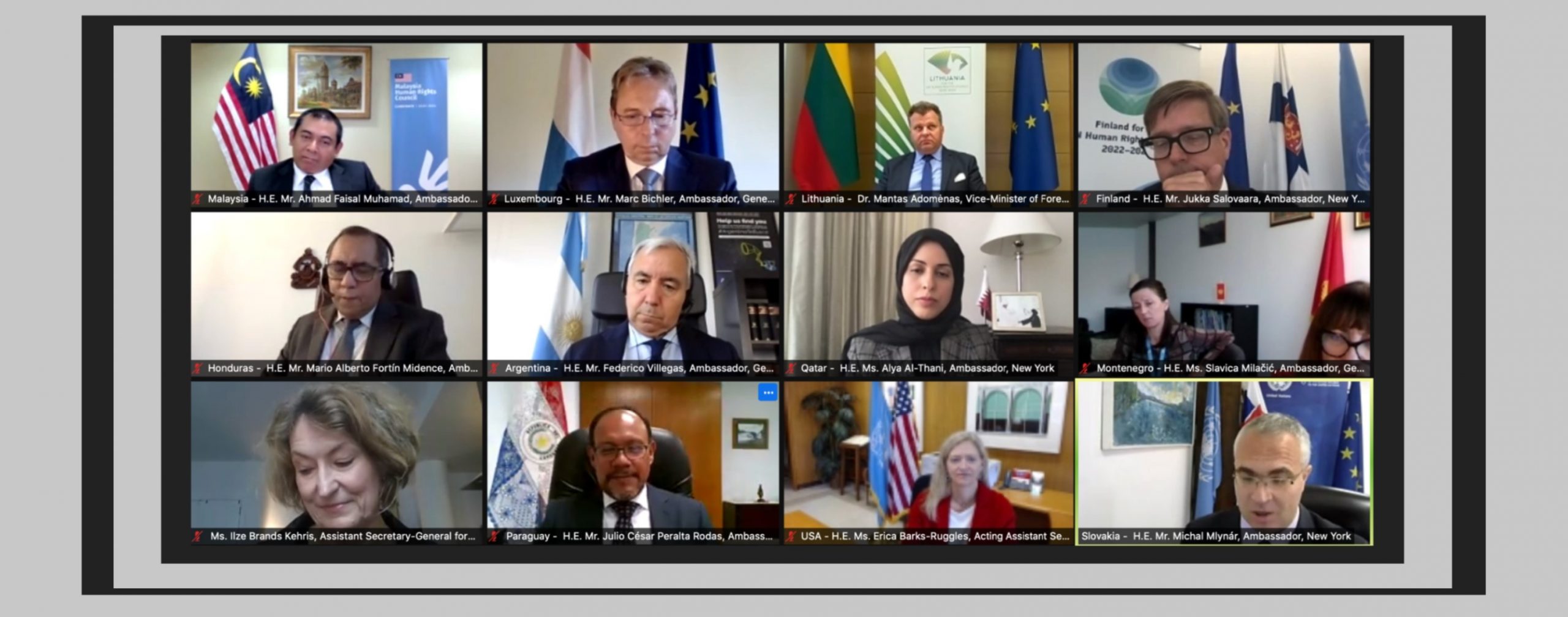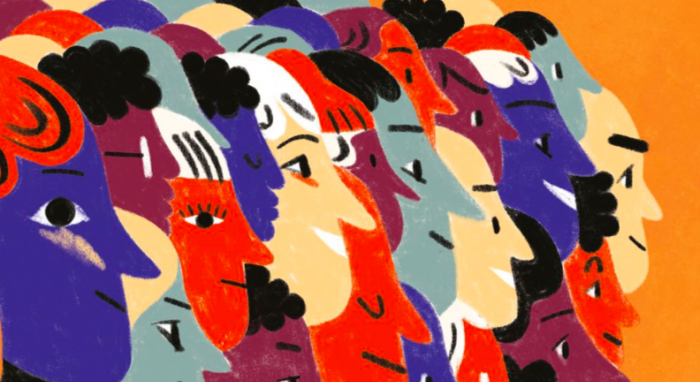The launch event, moderated by ISHR Africa Fellow Antoine Tremblay, brought together State and civil society actors from the region and beyond. Panelists included Angelique Razafindrazoary, an environmental defender and Nirinarisoa Prisca Andrianalivelo, Vice President of the Commission Nationale Indépendante des Droits de l’Homme, from Madagascar, Anjeelee Kaur Beegun, a defender from Mauritius, and Commissioner Rémy Ngoy Lumbu, Chairperson of the African Commission and Special Rapporteur on Human Rights Defenders.
In his opening remarks, Antoine Tremblay explained that the report, ‘To be seen, heard and recognised‘, emerged in response to the calls of defenders from these island States, who felt overlooked within continental advocacy efforts.
The idea for this report emerged from conversations with defenders from island States who emphasised the lack of visibility for the violations they face and their isolation from the broader African human rights movement. The goal was to assess their current realities, highlight good practices, identify gaps, and ultimately advocate for more robust protection mechanisms.
Antoine Tremblay, Africa Fellow, ISHR
Antoine further highlighted that the realities for defenders across these countries vary, but common themes of restriction, isolation and vulnerability emerged.
In her remarks, Angelique Razafindrazoary noted that environmental defenders in Madagascar face pressure from both local authorities and powerful economic interests.
We face threats from companies, local authorities and individuals simply because we are protecting our forests, as our work is not seen as essential, it is seen as disruptive.
Angelique Razafindrazoary, Humanitarian and environmental association protecting the VOHIBOLA forest in Madagascar
She further revealed that defenders, particularly women, are often branded anti-development and anti-government, stigmatising their work and increasing their exposure to threats. She explained that many environmental defenders operate in isolated rural areas without formal education or legal awareness, making them particularly vulnerable. Her interventions underscored the urgent need for protection measures that recognise the intersectional risks faced by environmental and women human rights defenders.
Nirinarisoa Prisca Andrianalivelo, Vice President of the National Human Rights Commission (CNIDH) of Madagascar, acknowledged that while national institutions such as CNIDH are mandated to promote and protect human rights, they often operate within constrained legal, financial and political environments. Prisca emphasised that defenders, especially those working on environmental protection and women’s rights, continue to be vulnerable to threats and reprisals, often in remote or rural areas where state presence is limited.
We are deeply concerned about the isolation of defenders in regions where their work is seen as confrontational to local interests or power. They often stand alone, without access to support mechanisms or legal assistance.
Nirinarisoa Prisca Andrianalivelo, Vice President of the Commission Nationale Indépendante des Droits de l'Homme (CNIDH), Madagascar
In addressing how NHRIs can be more effective, she pointed to the importance of strengthening internal capacities, ensuring adequate funding, and adopting a proactive approach. She also stressed the need for strong, trust-based partnerships with civil society organisations, noting that NHRIs should not see themselves as above or outside civil society but as allies. Prisca concluded by reaffirming CNIDH’s commitment to work with regional and international mechanisms to strengthen the protection framework for defenders in Madagascar and across the island states.
Anjeelee Kaur Beegun, founder of the organisation ReKonekt in Mauritius, offered a powerful intervention highlighting the entrenched structural and cultural barriers faced by LGBTQ+ human rights defenders across the island states of Africa. She described a landscape where deeply rooted colonial-era laws, compounded by social stigma and political inertia, continue to silence queer voices and marginalise those who defend them.
Defending LGBTQ rights in the islands is not just unpopular - it’s dangerous. We are criminalised by law, targeted by society, and ignored by our governments. Even human rights mechanisms often see our existence as an afterthought.
Anjeelee Kaur Beegun, Human rights defender, Mauritius
Anjeelee stressed that the criminalisation of same-sex relations in several island states does not merely exist on paper but serves as a tool for harassment, blackmail, and institutional exclusion. She also addressed the lack of political will among state actors and the reluctance of national human rights institutions to meaningfully engage with or protect LGBTQ+ defenders.
Commissioner Rémy Ngoy Lumbu commended ISHR for the vital report and acknowledged the gaps in state compliance with their obligations under the African Charter. He reiterated the African Commission’s commitment to working with defenders in the island States and emphasised the need for defenders to engage with the Commission’s mechanisms to ensure their voices are heard and their protection needs addressed.
We hope this report will trigger action — not just from governments, but from African and international actors committed to human rights. Visibility, connection, and solidarity are key.
Commissioner Rémy Ngoy Lumbu, Chairperson of the ACHPR and Special Rapporteur on Human Rights Defenders
The event concluded with a call to action for stronger collaboration between civil society and regional mechanisms, better implementation of existing human rights instruments, and increased visibility and solidarity for defenders working in underrepresented contexts.
Author
Adélaïde Etong Kame
Adélaïde has a Master in International Law and Relations from the University of Clermont-Ferrand. Adélaïde worked with indigenous people and minorities in Mauritania for better protection of their rights, especially victims of slavery. Previously, she advocated for the rights of women in Poland and Macedonia as well as the advancement of freedom of expression in Central Africa.
Article also available in




